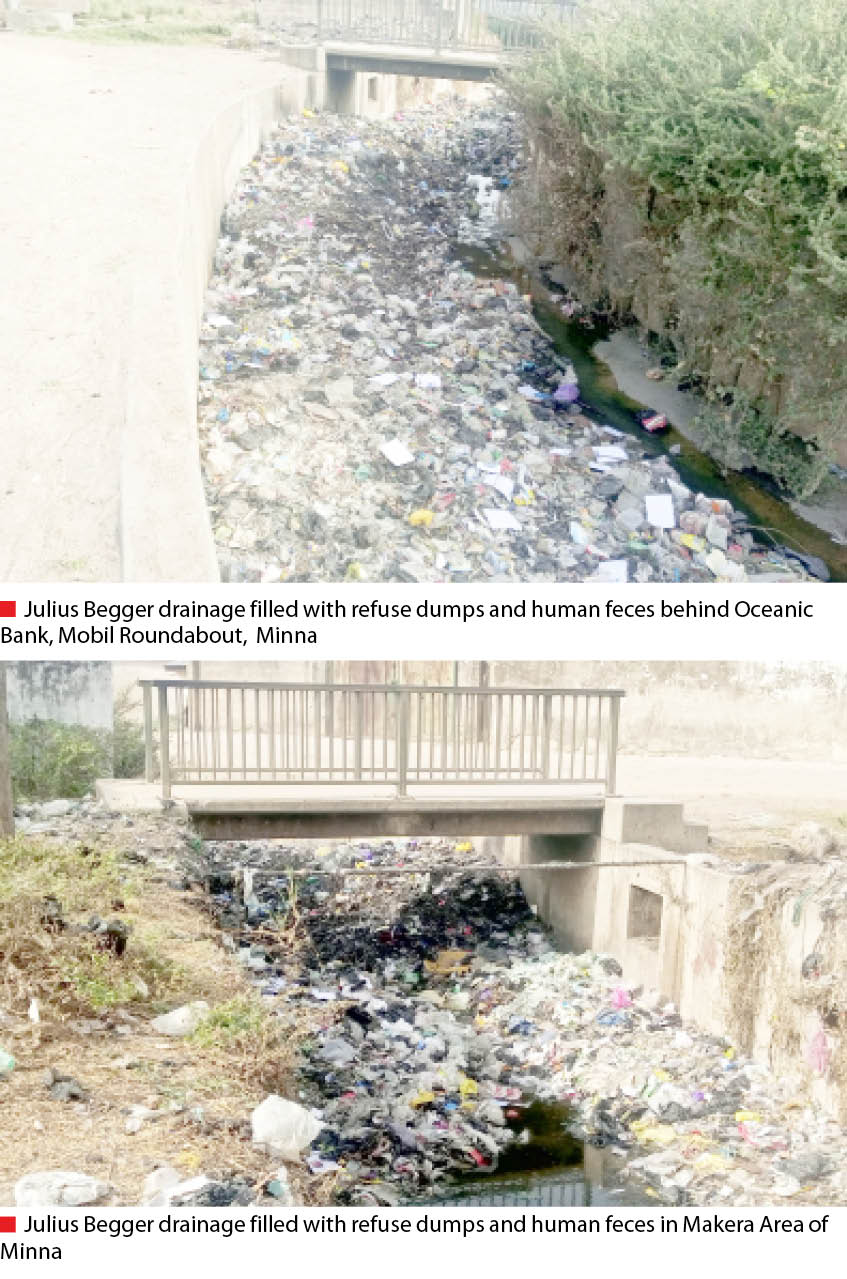Open defecation coupled with indiscriminate dumping of refuse in Minna, the Niger State capital is raising public health concerns among residents and stakeholders, Daily Trust Saturday reports.
Rising incidents of open defecation and indiscriminate dumping of refuse in Minna, the Niger State capital, have exposed residents to health hazards. Drainages and uncompleted buildings acrosss the city have been littered with human feces, becoming a serious public health challenge
Daily Trust Saturday found that residents defecate and dump refuse indiscriminately in drainages, canals and even on the centre of roads across the city. Mostly affected is the Julius Begger axis, where drainages extend across all parts of the state capital, as well as uncompleted shops at the Kure Ultramodern Market.
The drainage at Julius Beggar, which helped in the control of flood in Minna and its environs, was constructed during the military regime of General Ibrahim Badamasi Babangida.
Some residents told Daily Trust Saturday that open defecation had become a ritual to some people, who engage in it even when they have toilets in their houses. They also said those who engaged in it were able to do so because there is no good lighting system; hence everywhere is usually dark at night when they do it.
Daily Trust Saturday observed that food vendors and fruit sellers do business in front of some of these drainages and heaps of refuse, and people patronise them.
Some residents who spoke with our correspondent claimed that they did not have any idea of the health implications of open defecation and indiscriminate refuse dump.
Environmental experts said the situation was unacceptable, especially as it exposed residents to a lot of health hazards. They called on the government and concerned agencies to put measures in place to address the menace.
Some residents attributed the rising cases of open defecation in the city to water scarcity, which they said made it difficult for residents to use toilets in their houses.
The Head of Hospital Services, General Hospital, Wushishi and chairman, National Association of Government Medical and Dental Practitioners (NAGGMDP), Niger State chapter, Dr Umar Ndagi, said open defecation and indiscriminate refuse dump were serious public health challenges that could cause serious diseases like cholera, diarrhea, typhoid fever, polio, worm infestation, as well as contaminating the air the people breathe in.
“The bacteria that causes typhoid fever usually passes through fecal matter, and during the rainy season, the eggs of these bacteria are washed into the lagoon or river; and people use this water from these lagoons to water their vegetables or gardens. And we consume these vegetables on a daily basis. By doing so we are injecting the eggs of these bacteria and the bacteria into our systems, and that is how we come down with typhoid fever and polio. However, the common sickness associated with open defecation is diarrhea, which is one of the major causes of child mortality, especially children that are less than five years.
Citing a World Health Organisation (WHO) report, Dr Ndagi said 2,000 children of less than five years old died from diarrhea every day.
He said open defecation also had a gender impact on women, explaining that, “It affects the dignity of women; hence they are usually ashamed to be seen outside defecating or urinating. So, they usually look for a secluded area, either at night or in the bush during the day where nobody would see them. In so doing, they are exposed to gender-based violence and exposed to sexual molestation.
“There is also the issue of worm infestation, and that is why children that are less than five years old have to be de-wormed regularly. One of the ways they have these worms in their bodies is open defecation. The soil can produce worms, especially hookworm, which can penetrate one’s leg and get into the body, especially the children that play around.”
He said there was a need for massive sensitisation for attitudinal change.
One of the residents of the town, Bala Aliyu said, “People defecate and dump refuse anyhow in some areas. And water supply is not regular in Minna.
“Also, most often, the sanitation agency does not have the capacity to go to households to collect their refuse and dispose properly. It does not have the facilities. They use open vans to evacuate refuse, and as the truck is moving, the refuse will be scattered by breeze.
“Open defecation is not only in Minna, it happens in Bida and other major towns where you even expect people to be more civilised and hygienic. In Niger State, open defecation is worse in cities and towns than even the rural areas because of lack of water supply.”
Sule Hamidu, a resident of the Kwangila area of Minna, told Daily Trust Saturday that his child and wife were once victims of cholera outbreak.
“I was once a victim of cholera outbreak years back. My daughter and wife were affected, but luckily, they survived. Unfortunately, three adults and five children died from the outbreak in my area. So, there should be sanitary inspectors who go round to stop open defecation and indiscriminate dumping of refuse. The state government should also bring back the weekly sanitation exercise,” he said.
Another resident, Aisha Shuaibu, whose house is close to the Julius Begger drainage on Yoruba Road, Minna, told our correspondent that they hardly stayed outside their rooms during the dry season because of unpleasant smells. She said, “Government should help us stop those defecating on these drainages every morning.”
Abdul Abubakar Kuta, a resident of Sabon-Gari, said most of the defecations were done in the night because of the poor lighting system in the state capital.
Also, Salisu Abdullahi, who sells fruits in front of a heap of refuse in Kure Market, said the situation was affecting his sales as many people hardly buy from him when they see flies on his fruits, even when he always covers his table with leather.
Traders in Kure Market told our correspondent that they were already paying millions of naira as revenue to the government and believed the evacuation of heaps of refuse in the market should not be their responsibility.
Daily Trust Saturday learnt that the Niger State Environmental Protection Agency (NISEPA), which has the mandate to protect the environment, including water bodies, lacks the capacity to discharge its duties. It was revealed that the agency has only 34 trucks evacuating refuse across the state and 80 per cent of them are on contract.
Findings also revealed that the rising cost of diesel has made it difficult for the contracted companies and the agency to adequately evacuate refuse.
On December 6, 2022, the 2021 Multiple Indicator Cluster Survey (MICS) report unveiled by the state planning commission, with support from the United Nations International Fund (UNICEF), Kaduna Field Office, ranked Niger State as the worst in the North Central in terms of open defecation. The report showed that over 40 per cent of residents of the state indulged in the menace.
The survey was carried out by the National Bureau of Statistics (NBS).
The governor of Niger State, Abubakar Sani Bello, represented by the secretary to state government, Ahmed Ibrahim Matane, confirmed that the state was not doing well in addressing the open defecation aspect of the Water and Sanitation Hygiene (WASH) Programme.
When contacted, the deputy general manager, Environmental Monitoring and Pollution Control, Niger State Environmental Protection Agency (NISEPA), Dr. Aisha Adamu, said the agency was doing its best to curtail open defecation and indiscriminate dumping of refuse, especially in drainages.
“The agency is doing its best to curtail open defecation across the state to the barest minimum. Yearly or quarterly, we always ensure that we evacuate the drainages, most especially the Julius Begger drainages. But even as we are doing our best, people are spoiling the work of the agency. We have an enforcement team that is going round on a daily basis to ensure that the culprits are sanctioned. So, it has reduced when compared to 2020 and 2021,” he said.
Dr Adamu also said the agency was collaborating with ministries of land, housing and water resources to address the challenge of open defecation, especially by sanctioning owners of uncompleted buildings that have not been occupied for many years.
She attributed the cause of open defecation to poverty, saying, “Most of the people that engage in open defecation do not have serious shelters. In the places they live, there is no water cistern to use toilets. Unfortunately, open defecation can lead to an outbreak of diseases.
Dr Mohammed Abubakar Sadiq of the Department of Agriculture and Bio-Resources Engineering, Federal University of Technology, Minna, said some crops grown through contaminated water in form of irrigation farming had health implications, especially those consumed raw. He said, “These crops contain micro-organisms that go into the food chain and the human system. In the end, people defecate indiscriminately and you see an outbreak of cholera.
“You can see that in recent times, the death toll in Minna has risen. I took a survey a year ago. A data from the general hospital showed that from 2006 to 2021, 800 – 900 deaths were recorded yearly in that health facility alone. So, a lot of public conveniences need to be built within the town. It should be done in such a way that people pay for maintenance. This will reduce the rate of open defecation.”

 Join Daily Trust WhatsApp Community For Quick Access To News and Happenings Around You.
Join Daily Trust WhatsApp Community For Quick Access To News and Happenings Around You.


